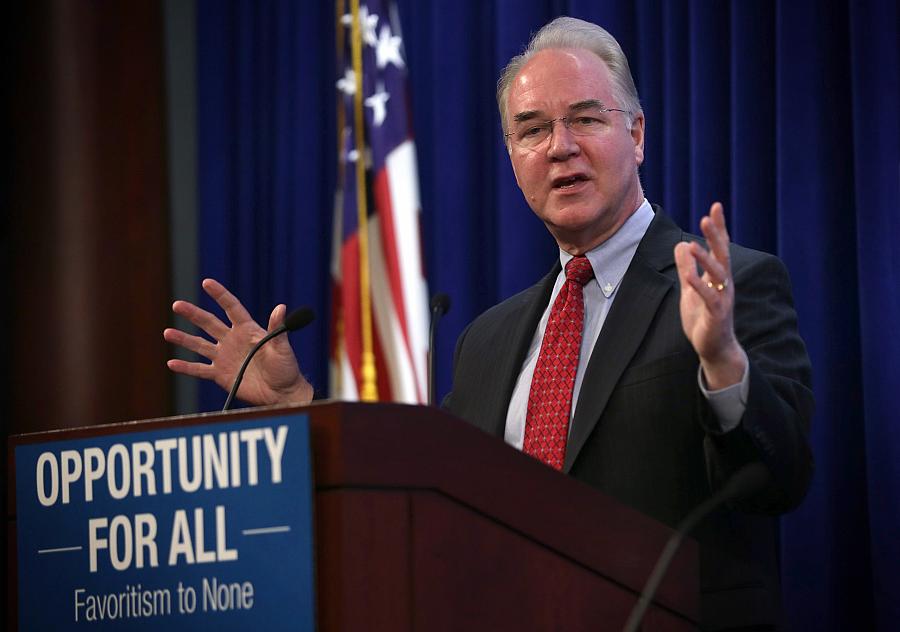What do new HHS picks signal for children’s health policy?

Rep. Tom Price (R-GA), President-elect Donald Trump's pick for secretary of Health and Human Services. (Photo: Alex Wong/Getty Images)
With news of President-elect Donald Trump’s picks for two big health-policy positions out this week, we now have a few more tea leaves by which to ponder the future of Medicaid and the Children’s Health Insurance Program (CHIP), two key programs for ensuring lower-income kids have access to health care.
Children make up 51 percent of the enrollment in Medicaid and CHIP nationwide, or more than 35 million kids. In Georgia, the home state of Rep. Tom Price (R-Ga.), Trump’s pick for secretary of Health and Human Services, the percentage of kids in these two safety-net programs rises to 70 percent. As these kinds of numbers suggest, any changes to Medicaid and CHIP will inevitably have major consequences for children’s health coverage.
With Indiana health policy consultant Seema Verma picked to head the Centers for Medicare & Medicaid Services, Medicaid reform now appears very much on the table under a Trump Administration (Verma played a key role in Indiana’s conservative version of Medicaid expansion.) And that worries children’s health advocates.
Joan Alker of Georgetown’s Center for Children and Families expects the appointments of Price and Verma to bring major changes to Medicaid, as the panicked headline to her recent blog post suggests: “Trump picks for HHS signal radical restructuring of Medicaid contemplated with coverage for millions of children and families at risk.” Alker points to Verma’s unique resume:
“As best as I can recall, this is the first time that a CMS Administrator comes to the job with experience primarily working on Medicaid (as opposed to Medicare). This signals that we can expect very radical and, in my view, dangerous changes to be proposed to the Medicaid program.”
But others were heartened by the appointment. Veteran health care consultant Bob Laszewski told MedPage Today that Verma is an “outstanding pick” and described her as “the godmother of conservative Medicaid reform ideas and implementation.”
One key question is what happens to the Medicaid expansion in the 19 states that enlarged their programs, as called for by the ACA. Price’s suddenly much-discussed plan to replace Obamacare would unwind the expansions, as Vox’s Sarah Kliff noted Tuesday:
The biggest cut to the poor in Price’s plan is the full repeal of the Medicaid expansion, a program that currently covers millions of low-income Americans, which Price replaces with, well, nothing.
But Medicaid may be staring down an even more fundamental change in how it’s funded. Trump, Price and fellow Republicans strongly support block grants for Medicaid, a system in which the federal government pays a set amount to each state to pay for enrollees.
Conservative proponents of block grants say they give states far more flexibility in how they design their Medicaid programs, and would save the federal government money. Liberal critics say it’s a ruse for cutting funding and giving states a green light to offer fewer benefits to their most vulnerable residents.
Earlier this year, health policy expert Edwin Park at the left-leaning Center on Budget and Policy Priorities analyzed Price’s budget plan and found that its use of block grants would cut Medicaid by $2.1 trillion over 10 years, a 33 percent reduction from current funding levels.
And those worried about health disparities point out that such block grants could create a patchwork quilt of benefits between states, with some children receiving more expansive coverage than others, based on geography.
Trump has also called for moving CHIP to block grants. With the program’s current funding expiring in September 2017, such proposals will undoubtedly be part of the coming year’s debate. As The Washington Post’s Amy Goldstein and Elise Viebeck noted this week, Price’s support for the program has been uneven:
In 2009, one of the three times during his House tenure that Congress has renewed the Children’s Health Insurance Program, created nearly two decades ago to help working-class families, Price voted against its extension.
That kind of record deeply worries people like Bruce Lesley, president of First Focus, a D.C.-based child advocacy group, who tweeted:
Sadly, Tom Price, HHS nominee, has a history of voting against the Children's Health Insurance Program (CHIP). https://t.co/mP2bICwFDQ pic.twitter.com/G9TF2eqdws
— Bruce Lesley (@BruceLesley) November 29, 2016
Just how Price’s sweeping policy prescriptions and Verma’s conservative version of Medicaid will be reworked under the impress of a Trump administration and GOP-led Congress will remain the central questions health reporters will be tracking over the course of the next year.
Meanwhile, children’s advocates will continue to worry about potential cuts to Medicaid and CHIP that could leave children in lower-income families either underinsured or uninsured entirely.
As The New Yorker’s John Cassidy put it, “At this stage, about the only thing we can say for certain, or near certain, is that the big losers in whatever legislation might emerge will be the poor and the sick.”
**
Related posts
Election result could have major implications for children’s coverage
The candidates field questions on children’s health, but have we learned anything?
Medicare bill’s passage throws lifeline to children’s health insurance

